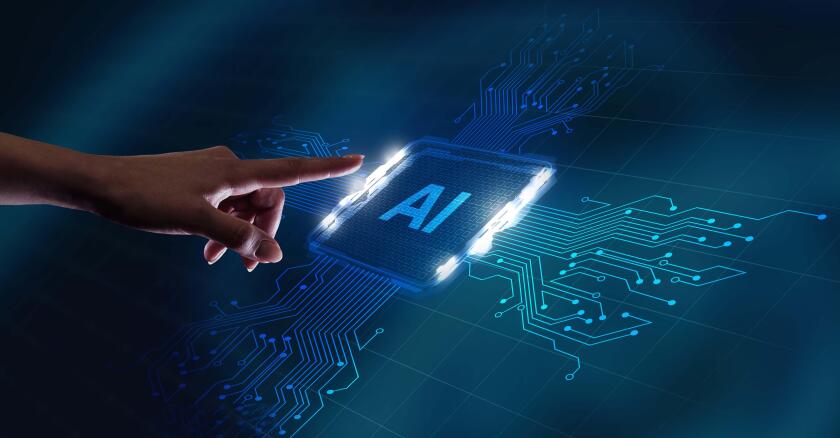That process, started in 2019, took a big leap forward last fall when the 177,000-student suburban Atlanta district opened what some experts call the nation's first AI high school.
Seckinger High offers stand-alone courses and electives in AI but also embeds the technology and its principles into math, science, language arts, and other subjects to ensure all students graduate with a solid understanding of how artificial intelligence works. For instance, a social studies teacher might incorporate how data scientists use the technology to track diseases in today's world into a lesson on the spread of cholera in the 19th century. Three nearby elementary schools and a feeder middle school have a similar AI focus.
Ultimately, Gwinnett aims to expose all kids to artificial intelligence in every subject, as they move from kindergarten to 12th grade. Students who find themselves particularly drawn to the topic will get opportunities to delve even deeper into how the technology works and the ethical implications of using it.
What has Gwinnett learned from Seckinger's first year and from being on the leading edge in teaching AI literacy? Education Week spoke with Sallie Holloway, the district's director of artificial intelligence and computer science. (Holloway said she has yet to meet another district leader who has AI in their job title.)
This conversation—which took place on Zoom—has been edited for clarity and brevity.
Why does Gwinnett believe every student needs to understand AI?
If you are a person using any type of technology, you are likely interacting with AI in some way. Societally and culturally, we're going to see AI show up a lot more in social media and communications and just the day-to-day tasks that we do outside of the workplace as well. We've seen how technology can create such a gap in opportunities for our students if they don't have access. So for us, it was a no-brainer. Every kid needs access to AI if they're really going to be successful in the workplace, society, community, whatever's next for them.
What happened in your district when ChatGPT 3 came out late last year?
It was so interesting, because the AI cluster schools were so excited. They were like, "This is just the coolest technology! How does it work? Let's look under the hood. Let's like talk about it with our kids?" Then, in our schools that aren't piloting this work, it was a mixed reaction. There was a lot of "What is this? Is it sentient?' or even 'All of education is going to crumble!"
What were the big concerns with ChatGPT?
The biggest thing that came up for education was cheating, right? That's what everyone was talking about when ChatGPT came out.
We're not going to ban ChatGPT. We think that it's a tool. We want to teach our kids how to use it ethically and responsibly and how to trust and not trust certain things that might come out of it.
But we also know that if you are creating and submitting something that is not your original work, but you're pretending it's your original work, that's still plagiarism, no matter what tool you use. We really felt strongly that definition still stands.
On the flip side of things was, "How do we help our teachers understand what this is and what it's not? How they can leverage it in their classroom?" We don't want people to be scared of this tool. We want them to know how to be good users of this tool.
Did you feel pressure to move more quickly on AI literacy after ChatGPT 3 came out?
Honestly, it definitely created a bigger sense of urgency. The speed with which it showed up in our classrooms was like, 'Oh, wow, like, we really need to figure out how to share what we're learning with everybody else.' Even if it's not perfectly polished, even if it's messy and we're still learning, which honestly is where we are.
I think some of the teachers and leaders who maybe thought of the AI cluster as 'Oh, this is a cool little project' suddenly were like, 'Oh, wow, this is an important part of education.'
What's been the biggest challenge in launching an AI-focused high school this year?
AI can be really scary for teachers. I had a great conversation with one of our math teachers last week who said "Sometimes, I don't want to try something because I'm afraid that I'm gonna give the wrong information about AI or data science or whatever is happening because I don't feel like I knew enough." Trying to make sure that our teachers have the right amount of background knowledge without totally overwhelming them is a tough balance. Helping teachers understand that it's OK if you don't know much about a topic but here's how you could go about learning it with your kids in a safe way.
Your plan was to embed AI into all subjects and offer a high school elective course, too. Is that what you are doing now?
AI is still embedded in everything. Every kid doesn't have to take that elective AI course, but honestly, so many kids want to, which is interesting. I know that the last time I spoke to the high school they were overcapacity already for next year for the number of kids who want to enroll in that course.
© 2023 Education Week (Bethesda, Md.). Distributed by Tribune Content Agency, LLC.















